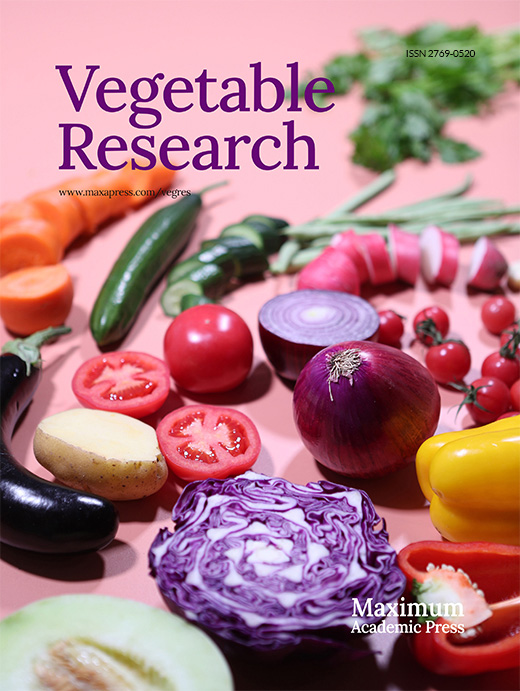-
Vegetables are essential to human health by providing a source of dietary fiber, vitamins, minerals, health promoting bioactive phytochemicals, and other nutrients in our diet. Some root and tuber vegetables also serve as staple crops. Vegetables enrich our lives by adding color, texture, and flavor to our foods. Vegetables play critical roles in the agricultural economy. In many developing countries, vegetable production generates significant income and employment for rural economies.
Vegetables are biologically fascinating with unique biological processes in many species that are appreciated by plant biologists as research subjects. Vegetables are extremely diverse, which is reflected in the broad category of what is considered a vegetable. Over 400 vegetable crops from 70 families and 230 genera are cultivated worldwide. Almost all plant parts can be consumed as vegetables: leaves, stems, roots (bulbs and tubers), flowers, inflorescences, immature and mature fruits, pods, and seeds. Many vegetables exhibit astounding diversity in size, shape, color, life cycle and end use, which is the result of long-term natural and/or diversifying selection for adaptation to natural environments, human needs, commercial production, or food processing. Thus, vegetable research offers great opportunities for exciting scientific discoveries.
Like many other horticultural crops, vegetables are considered minor or specialty crops. For a long time, vegetable research was far lagging behind field crops and model plant species. This could be attributed to the lack of necessary genetic and genomics resources and limited government investment on research, to name a few. However, technology advancement in the last two decades, especially ever-evolving genome sequencing and genome editing technologies, has revolutionized vegetable research. For example, the draft genomes of near 50 vegetable crops/genotypes have been published, which are fundamentally transforming our understanding of the domestication, evolution, and molecular processes of vegetable crops. Translational research is also accelerating vegetable improvement and production. Indeed, in the last decade, we have seen exponential increase in vegetable research publications. However, very few platforms are dedicated to disseminating research advances in vegetable crops, motivating us to launch the journal Vegetable Research (VegRes).
Vegetable Research aims to become a major resource of innovative knowledge in vegetable science. Vegetable Research welcomes original research articles, methods, resources, and reviews in all areas of vegetable research including but not limited to genetics, breeding, omics, molecular biology, biotechnology, interactions with environments and with other biological systems, and production pre- and post-harvest. Vegetable Research also aims to provide a community forum by publishing Editorials and Perspectives on specific issues or topics in vegetable research.
I have the honor to be the inaugural Editor-in-Chief of Vegetable Research, and I am happy to accept the challenges and responsibilities of developing Vegetable Research into a respected professional journal in vegetable science and plant biology. It is a privilege for me to work with an excellent team of Associate Editors. I would like to take this opportunity to thank all Editorial Board members who are willing to contribute their time and expertise to serve the journal and the vegetable research community. In the future, more Associate Editors will be recruited to handle and organize manuscripts on vegetable research in new frontiers and interdisciplinary fields. The editorial process will also be periodically reviewed and updated in response to the new and emerging trends of vegetable research and to maintain the consistency of editorial actions. The journal is a peer-reviewed publication. I will work closely with Associate Editors and reviewers to critically assess all manuscripts, provide helpful feedbacks, and make sound recommendations in a timely manner. Vegetable Research will follow Committee on Publication Ethics (COPE) guidelines (https://publicationethics.org/).
Vegetable Research is an international, open-access, online journal published by Maximum Academic Press (http://www.maxapress.com/journal/vegres) using a continual publication model for rapid turnaround from manuscript submission to publication to facilitate public access and knowledge exchange. On behalf of the editorial board members, I cordially invite everyone in the vegetable research community to submit his/her exciting discoveries to Vegetable Research. We also welcome and value your suggestions and ideas for making the journal an indispensable source of knowledge and a forum for the vegetable research community.
HTML
- The authors declare that they have no conflict of interest.
- Copyright: © 2021 by the author(s). Exclusive Licensee Maximum Academic Press, Fayetteville, GA. This article is an open access article distributed under Creative Commons Attribution License (CC BY 4.0), visit https://creativecommons.org/licenses/by/4.0/.
|
|












